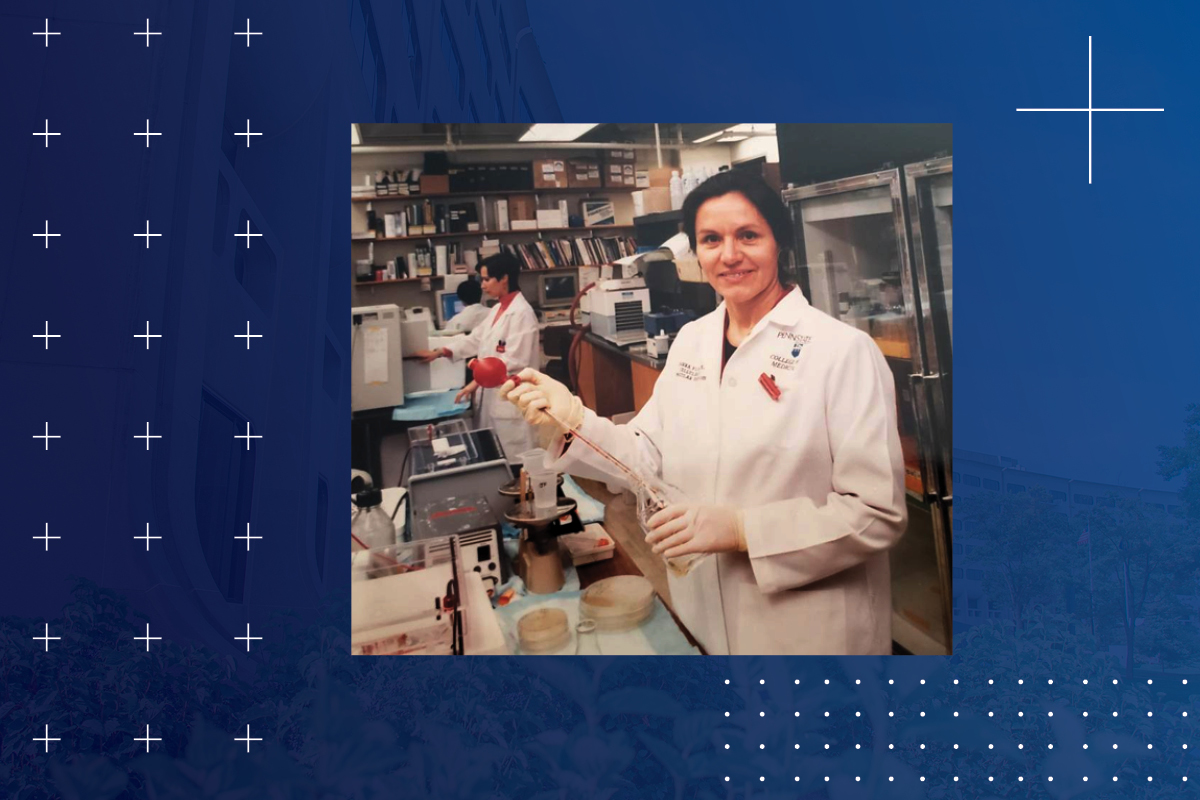Lung disease research pioneer, Penn State servant retires

After more than 30 years working at Penn State College of Medicine, Joanna Floros, PhD, Evan Pugh University Professor of pediatrics and obstetrics and gynecology, has decided to finish her career on a high note — literally. As part of her plans for retirement, the scientist, mother, educator and wife has started taking piano lessons.
“It’s something I’ve always wanted to do, but never had the time for,” admits Floros, who was honored for her contributions to the University by receiving faculty emerita status.
Leisure time was certainly rare for Floros during her career. She mentored more than 50 graduate and medical students, postdoctoral scholars and junior faculty; was one of only two College of Medicine faculty to be elected chair of the Penn State Faculty Senate, a University-wide body she served on for many years; managed a productive research laboratory; raised two children; served national and international organizations, including as an elected member of the board of trustees (Symboulio) at the University of Ioannina, Greece; and earned the Evan Pugh University Professorship, the highest honor Penn State can bestow on its faculty.
Floros came to the Penn State in 1991 as the first woman to be recruited and hired by the College of Medicine with the rank of tenured full professor. By that time, she was already an accomplished researcher. She is credited with being the first to clone and characterize the copy DNAs of, or genetic instructions for producing, human surfactant protein A (SP-A), and study their molecular complexity. Surfactant proteins are critical for lung function. After arriving at the College of Medicine, she continued this line of study and explored how genetic variations of the surfactant proteins related to lung disease risk. Her laboratory also studied the regulation of surfactant protein variants.
From Greece to Greater Harrisburg
Floros’ research is well known by scholars who study lung function and disease, but she loves to remind people that she came from humble beginnings. She was born in Kainourion, Agriniou, Greece in the early 1950’s, and later attended school in Athens. Although her parents were poor and had no formal education, they encouraged her in her studies.
“The foundations of my success started with my parents’ unconditional love,” Floros said. “They instilled in me that I could do anything I put my mind and heart to. Their encouragement endowed me with perseverance and determination.”
Floros was an orphan by the time she graduated high school, which led her to go pursue her undergraduate studies in Boston, where her brother and his family lived. She developed an interest in science during her undergraduate education that stemmed from losing her two parents to prolonged illness early in her life.
“I had fantasized about becoming a medical doctor, but after some experiences in my undergraduate years, I realized that I empathized too much with the pain and suffering of the patients I encountered through a work study experience,” she recalled. “Research was the best thing for me. I realized I could contribute to the medical field behind closed doors and still make an impact.”
Floros blossomed as a scientist during her years in graduate school at Temple Medical School. With the support of her mentors and peers, she left behind the survival mode of her undergraduate years where language, cultural and financial barriers made it difficult to thrive. She then returned to Boston as a National Institutes of Health-funded postdoctoral fellow at Harvard Medical School, where she eventually attained the rank of associate professor. In the early 90s Floros relocated to the Greater Harrisburg area so she and her husband — David Phelps, PhD, professor emeritus of pediatrics, who also retired this past year —could start their new positions at the Penn State.
“He [Phelps],was my most important colleague and contributor to my research,” Floros said. “We were also collaborators in life, raising a family together as well. His support was crucial to my success.”

Joana Floros, third from right in the front row, stands with members of her research lab at Penn State College of Medicine in the 1990s. This group contributed to helping her continually secure National Institutes of Health funding to explore SP-A gene variants and how they contribute to lung function and disease.
Building upon her research excellence
Upon arriving at the College of Medicine, Floros continued to expand her research on pulmonary surfactant proteins, especially human surfactant protein A (SP-A). While existing evidence said there was only one human SP-A gene that provided the instructions for the protein, Floros intuited from her and other scientists’ experimental data that there were two genes that encoded instructions for the creation of SP-A – unlike the single gene in other organisms.
“It was a controversial idea at the time, so I wrote a grant saying I would explore this second gene, which hadn’t been proven to exist yet,” Floros recalled. “It was a bold assumption for me to make. But shortly after submitting this grant, data from another group were published confirming this second gene existed, which resulted in my getting the grant. Sometimes science is about following the evidence and taking risks.”
Photo 2 – Joana Floros, third from right in the front row, stands with members of her research lab at Penn State College of Medicine in the 1990s. This group contributed to helping her continually secure National Institutes of Health funding to explore SP-A gene variants and how they contribute to lung function and disease.
Floros said the additional National Institutes of Health R01 grant, one of several she would secure during her career, laid the foundation for the next three decades of her research. She explored how variations of both SP-A genes can alter the protein’s function under various conditions. She also studied how environmental exposures and sex differences affect the expression and function of human SP-A variants, using cell and animal models. Her research on the subject was published in more than 200 articles and reviews, cited more than 8200 times and presented locally, nationally and internationally.
For her contributions to the field, Floros was recognized not only by Penn State, but by numerous national and international societies and Universities.
Her most notable awards include:
- Genentech/American Lung Association Career Investigator Award (1988)
- National Institutes of Health MERIT Award (1996)
- Penn State Faculty Scholar Medal for Outstanding Achievement (1997)
- Penn State Evan Pugh Professorship (2004)
- Honorary degree, University of Ioannina, Greece (2004)
- Honorary degree, University of Thessaly, Greece (2013)
- Fellow of the American Association for Advancement of Science (2015)
- Bond Bradley Award for outstanding mentor, Postdoctoral Association, College of Medicine, Penn State University (2018)
- American Thoracic Society Fellow (2019)
- American Thoracic Society Scientific Recognition Award (2019)
- Career Excellence Award, Penn State College of Medicine (2019)
- American Physiological Society Fellow (2019)
- Penn State College of Medicine Excellence in Career Mentoring Award: Master Career Mentor (2021)
Leaving her impression on the next generation
Floros trained more than 50 students, postdoctoral scholars, medical fellows and residents and junior faculty throughout the course of her career.
“Dr. Floros was absolutely crucial to my early research career and I’m fortunate to count myself among her mentees,” said Neal Thomas, MD, associate dean for clinical research at the College of Medicine. “I was able to lean on her expertise and mentorship to understand a new area of research — surfactant protein genetics. This helped us apply knowledge of surfactant protein variants to work I was doing in pediatric clinical trials involving surfactant replacement therapy. We were able to gain a better understanding of why disease severity and response to these treatments differed between patients.”
Not only has Floros made an impact by shaping tomorrow’s scientists and clinicians, but she made a sizeable donation to Penn State Institute for Personalized Medicine that will help others in their studies. She’s passed on her career’s collection of about 10,000 human biospecimens — including tissues and blood specimens from patients with lung diseases — along with information that will allow others to study the genetics of lung disease further by applying advanced technologies.
Always researching and learning
Piano isn’t the only hobby Floros is pursuing in retirement. When she’s not finishing up some of her collaborative research projects, she’s learning to speak Spanish again, something she hasn’t spoken in decades. She’s also planning to travel – spending some time in her native homeland, while also exploring new destinations.
But Floros can’t quite leave research behind her altogether. She’s started a family genetic genealogy project and connected with relatives she didn’t know existed before she began the project.
It’s that enthusiasm for discovery that defines Floros. And something she encourages anyone pursuing a career in science and research to embrace and hold onto.
“Choose an area you’re passionate about pursuing and working hard for. Believe in yourself and surround yourself with people who energize you and appreciate your brilliance.”

Joanna Floros, fourth from left in the front row, stands with members of her lab at Harvard Medical School in the 1980s.
If you're having trouble accessing this content, or would like it in another format, please email Penn State Health Marketing & Communications.
